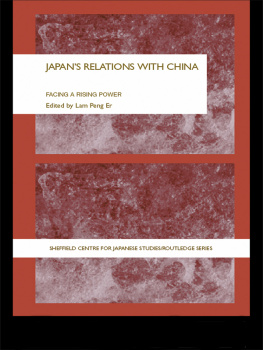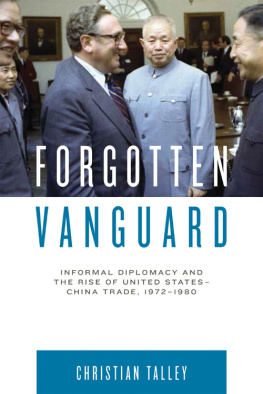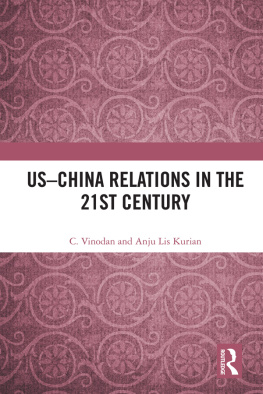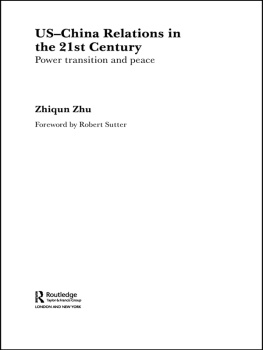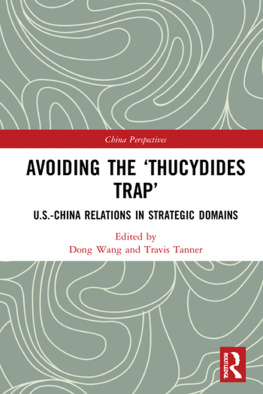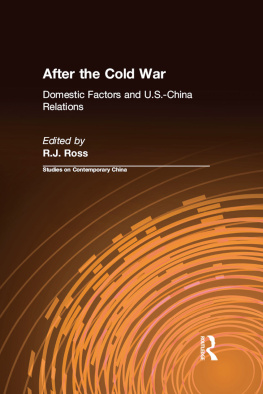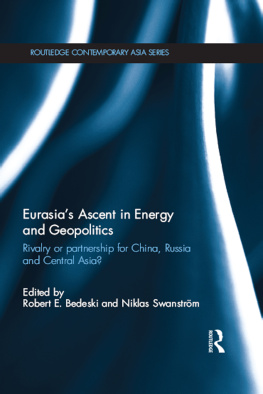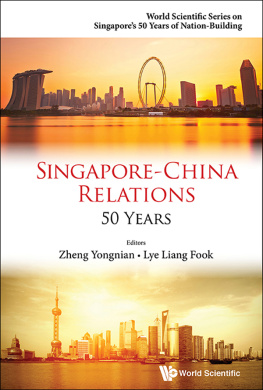About the Editor and Contributors
EDITOR
David Shambaugh is professor of political science and international affairs and director of the China Policy Program in the Elliott School of International Affairs at The George Washington University. He is also a nonresident senior fellow in the Foreign Policy Studies Program and Center for Northeast Asian Policy Studies at The Brookings Institution. Before joining the faculty at George Washington, he held the position of Reader in Chinese Politics at the University of Londons School of Oriental & African Studies (SOAS) and simultaneously served as editor of The China Quarterly . Professor Shambaugh has published widely on Chinas domestic politics, foreign relations, military and security, and the international relations of Asia. His most recent books are China Goes Global: The Partial Power (2013), Charting Chinas Future: Domestic & International Challenges (2011), Chinas Communist Party: Atrophy & Adaptation (2008), China-Europe Relations: Perspectives, Policies, and Prospects (2007), China Watching: Perspectives from Europe, Japan, and the United States (2007); Power Shift: China and Asias New Dynamics (2005); The Odyssey of Chinas Imperial Art Treasures (2005); Modernizing Chinas Military (2002). He is a frequent commentator on Chinese and Asian affairs in the international media, sits on the editorial boards of a number of scholarly journals, and has served as a consultant to various governments, research institutes, philanthropic foundations, and private corporations. He holds a B.A. from George Washington University, an M.A. from Johns Hopkins University (SAIS), and a Ph.D. from the University of Michigan. He has been a visiting scholar or professor at institutions in Australia, Brazil, China, Germany, Hong Kong, Italy, Japan, Russia, and Singapore.
CONTRIBUTORS
Rosemary Foot is professor of international relations and the John Swire Senior Research Fellow in the International Relations of East Asia, St Antonys College, University of Oxford, where she teaches predominantly on the International Relations postgraduate program. She has also held visiting fellowships at Peoples University, Beijing; Princeton University; the Belfer Center at Harvards Kennedy School of Government; as well as at IDSS in Singapore. Professor Foot holds an M.A. from the University of Londons School of Oriental and African Studies (SOAS), and a Ph.D. from the London School of Economics and Political Science. She has been elected a Fellow of the British Academy. She is the author or editor of several books, including The Practice of Power: U.S.-China Relations Since 1949 (1997), Rights Beyond Borders: The Global Community and the Struggle over Human Rights in China (2001), U.S. Hegemony and International Organizations (2003), and Does China Matter? A Reassessment (2004). Her latest book, with Andrew Walter, is China, the United States, and Global Order (2011). Her research interests cover the international relations of the Asia-Pacific, including U.S.-China relations, human rights, and Asian regional institutions.
Charles W. Freeman III is vice president for Asia, Middle East and Africa at PepsiCo. He is also a nonresident senior adviser for economic and trade affairs at the Center for Strategic and International Studies (CSIS). Previously, heheld the CSIS Freeman Chair in China Studies from 2004 to 2011. A second-generation China hand, he has lived and worked between Asia and the United States for his entire life. During his government career, he served as assistant U.S. trade representative (USTR) for China affairs. In this capacity, he was the United States chief China trade negotiator and played a primary role in shaping overall trade policy with respect to China, Taiwan, Hong Kong, Macao, and Mongolia, and oversaw U.S. efforts to integrate China into the global trading architecture of the World Trade Organization. He currently is a senior adviser to McLarty Associates, the global strategic advisory firm based in Washington, D.C., and serves on the Boards of Directors of the National Committee of U.S.-China Relations and the Harding-Loevner Emerging Market Fund Group. Freeman received his J.D. from Boston University School of Law, where he was an editor of the Law Review and graduated with honors. He earned a B.A. from Tufts University in Asian Studies, concentrating in economics, also with honors. He also studied Chinese economic policymaking at Fudan University in Shanghai and Mandarin Chinese at the Taipei Language Institute.
Bonnie S. Glaser is a senior fellow with the Freeman Chair in China Studies at the Center for Strategic and International Studies (CSIS), where she works on issues related to Chinese foreign and security policy. She is concomitantly a senior associate with CSIS Pacific Forum and a consultant for the U.S. government on East Asia. From 2003 to mid-2008, Ms. Glaser was a senior associate in the CSIS International Security Program. Ms. Glaser has written extensively on various aspects of Chinese foreign and security policy and international relations in the Asia-Pacific, including Sino-U.S. relations, cross-Strait relations, the role of think tanks and the PLA in Chinese foreign policy decision making, Chinese assessments of American power, China-Korea relations, and Chinese perspectives on missile defense and multilateral security in Asia. Her writings have been published in the Washington Quarterly, China Quarterly, Asian Survey, International Security, Problems of Communism, Contemporary Southeast Asia, American Foreign Policy Interests, Far Eastern Economic Review, Korean Journal of Defense Analysis, New York Times, and International Herald Tribune , as well as various edited volumes on Asian security. Ms. Glaser has been a regular contributor to the Pacific Forum quarterly Web journal Comparative Connections since its inception in 1999. She is currently a board member of the U.S. Committee of the Council for Security Cooperation in the Asia Pacific (USCSCAP), a member of the Council on Foreign Relations and the Institute of International Strategic Studies (IISS). Ms. Glaser received her B.A. from Boston University and her M.A. from Johns Hopkins School of Advanced International Studies (SAIS).
Avery Goldstein is the David M. Knott Professor of Global Politics and International Relations in the political science department, and associate director of the Christopher Browne Center for International Politics at the University of Pennsylvania. His research focuses on international relations, security studies, and Chinese politics. He is the author of Rising to the Challenge: Chinas Grand Strategy and International Security (2005), Deterrence and Security in the 21st Century: China, Britain, France and the Enduring Legacy of the Nuclear Revolution (2000), and From Bandwagon to Balance of Power Politics: Structural Constraints and Politics in China, 19491978 (1991). Among his other publications are articles in the journals International Security, International Organization, Journal of Strategic Studies, Security Studies, China Quarterly, Asian Survey, Comparative Politics, Orbis, and Polity , as well as chapters in a variety of edited volumes. Professor Goldstein is also a Senior Fellow at the Foreign Policy Research Institute in Philadelphia.
Yufan Hao is professor of political science and dean of the Faculty of Social Sciences and Humanities at the University of Macau. His areas of expertise are U.S.-China relations, Chinese foreign policy-making, Chinese politics, and Macau politics. He previously was on the faculty at Colgate University, Tsinghua University, and Peking University. He was also formerly a MacArthur Fellow at the Belfer Center for International Affairs at Harvard University, a Luce Fellow at the East Asian Institute in Seoul, and a Visiting Fellow at the Center for Northeast Asia Policy Studies at the Brookings Institution in Washington, D.C. He received his Ph.D. from Johns Hopkins University (SAIS). His book publications include: Macao and Sino-U.S Relations (2011), Chinas Policies on Its Borderlands and the International Implications (2010), Sino-American Relations: Challenges Ahead (2010), Challenges to Chinese Foreign Policy: Diplomacy, Globalization, and the Next World Power (2009), Chinese Social Sciences and Humanities Since 1978: Retrospective and Prospective (2008), and Chinese Foreign Policy Making: An Analysis of Societal Forces (2006).



